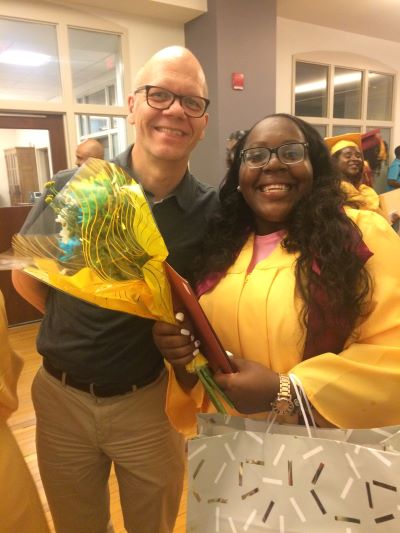Being with a journey with his mentee
In this installment of the DCFYI Digest, we sat down with Bill to discuss how he formed his relationship with his mentee.
DCFYI: Can you talk about yourself and your role with the organization?
Bill: I did a search online when I was interested in doing some volunteer work in D.C. and that's how I found DCFYI. I started volunteering with DCFYI more than six years ago, and when I first started volunteering, I was attending events regularly, pretty much once a month. And then about a year later I became a mentor to an amazing DCFYI youth. Around the same time, I took on the role as chairperson for the program evaluation committee. So, I've been leading that since then with a great team involved. And in addition, I frequently participated on different teams that Susan has put together, involved with interviewing, and selecting candidates for some DCFYI staff positions over the years.
DCFYI: Can you tell me more about your other volunteer work?
Bill: I have over 30 years of experience volunteering for various nonprofit organizations as well as serving on the board of directors for many nonprofit organizations. As a result, over the years, I've worked with youth similar to DCFYI. Also, I've worked with refugees, immigrants, people living with AIDS, international development, and persons convicted of a crime. In addition, I was a Peace Corps volunteer in Albania, working in community and business development for two years; that was in the 2000s.
DCFYI: What makes DCFYI so unique and so special? What draws you to the work that they do?
Bill: It's really the population they serve, meaning foster youth. Really, the foster youth face a number of challenges. And DCFYI works closely to build relationships with the youth, getting to know the youth, working with them, and seeing them as they develop and grow as individuals. The other thing I really like is the fact that you get a sense of a broader community. One of the great things with the events is that you get to know people throughout the community, which is also beneficial not just to foster youth, but the other volunteers.
DCFYI: Can you tell me what you enjoy most about your role in the organization?
Bill: For me, it's probably the relationship I have with my mentee. Since we've worked together for and known each other for over five years, we've gotten to know each other well over that time. I really enjoy spending time with her. I really think that to me is probably the most rewarding, she had just turned 18 when we met. She graduated from high school. Now she's living on her own. She's aged out of foster care. So being with her on her journey, I think is probably the most beneficial. And receiving feedback from her as to how much she values our friendship and relationships herself has been very rewarding.
DCFYI: Can you tell me about the biggest accomplishment that you have had since you've been involved with the DCFYI?
Bill: I think for me the biggest accomplishment is working with her as she aged out of foster care. That's probably my individual accomplishment. She was included in the first annual report that the DCFYI had created. And so, she provided her perspective in terms of aging out of foster care. So, for me, individually, that's probably the top one. For DCFYI, I think the biggest accomplishment is the success that DCFYI had despite COVID, the organization is still thriving and moving forward and continuing to support the foster youth in the DC area.
DCFYI: How would you describe the work that DCFYI does to your best friend?
Bill: What I typically do is indicate to my friends and family how critical the work is. Foster youth, the challenges they face and how they need a friend and need to enhance the relationships they have with other people because of the challenges that they face. That really is the key.
DCFYI: How does DCFYI help foster youth overcome their challenges?
Bill: It's really individual and it depends upon the person's situation. So, as you age out of foster care, there's several regulations and rules that need to be followed. Those are communicated by the city and their social worker that they have through the city. Those situations are not always clearly defined. They don't provide the details that are really needed. So, in many cases, I reached out to DCFYI to navigate that. And during the time period as it relates to COVID, it was difficult for the youth to be able to have a job that was steady enough to provide income for housing. So, in a number of cases, DCFYI would help out when the foster youth fell short. Fortunately, DCFYI had the resources to be able to help them.


